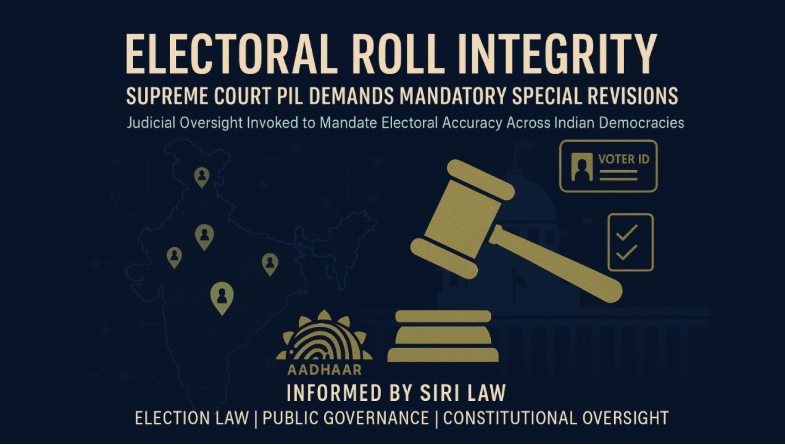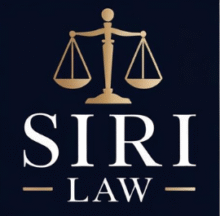
On July 8, 2025, a significant Public Interest Litigation (PIL) was filed before the Supreme Court of India, calling for judicial intervention to direct the Election Commission of India (ECI) to conduct Special Intensive Revisions (SIRs) of electoral rolls prior to every General and Assembly election across the country. The petitioner, a seasoned public interest litigator, has invoked Article 324 of the Constitution of India, which vests plenary authority in the Election Commission to supervise, direct, and control the conduct of elections.
This petition brings to light a persistent administrative issue: the accuracy and reliability of electoral rolls, which are central to the conduct of free and fair elections-a cornerstone of India’s constitutional democracy. It raises profound constitutional, procedural, and operational questions regarding the integrity of the electoral process, the duty of the Election Commission, and judicial oversight over electoral governance.
Legal Context and Background
1. Electoral Roll Governance under the Constitution and Statutes
The conduct of elections in India is governed by a blend of constitutional provisions, statutory mandates, and executive practices. Article 324 empowers the Election Commission to ensure the conduct of elections to Parliament and State Legislatures, as well as to the offices of the President and Vice President, in a manner that is free from error, manipulation, or external influence.
Electoral rolls are governed by the Representation of the People Act, 1950 and related rules framed under it. Section 21 of the Act provides for preparation and revision of electoral rolls, which includes both summary and intensive revisions.
- Summary Revision is typically conducted annually and involves limited public notification and correction.
- Special Intensive Revision, on the other hand, involves house-to-house verification, biometric and documentary checks, and is far more exhaustive.
The PIL contends that failure to conduct SIRs before every election has resulted in the following:
- Massive duplication of voter records
- Presence of deceased and migrated individuals
- Inclusion of ineligible voters, including minors or foreigners
- Suppression of genuine entries due to procedural irregularities
Grounds Raised in the Petition
The petition asserts that mere annual summary revisions are inadequate given the scale of India’s electoral machinery and the extent of data errors and manipulations reported across constituencies. The petitioner has cited studies and RTI responses from State Election Commissions revealing:
- Duplicate entries exceeding 10% in some urban centers
- Variance of over 5 million votes between population census and electoral rolls
- Undetected inclusion of deceased individuals, raising the risk of phantom voting
Core constitutional violations alleged:
- Article 14 – Discrimination arises when certain constituencies benefit from accurate rolls and others don’t.
- Article 19(1)(a) – Distorted rolls undermine the right to freely express political will.
- Article 21 – The right to vote, though statutory, when arbitrarily restricted, impacts life and liberty in a democratic framework.
- Article 324 – A constitutional obligation is implied on the Election Commission to adopt effective, transparent, and accountable revision methods.
The PIL, therefore, prays for mandatory judicial guidelines requiring the Election Commission to:
- Conduct SIRs before each General and Assembly election
- Deploy biometric linkage with Aadhaar, where permitted by law
- Undertake geo-verification and block-level audits
- Involve independent third-party monitors or constitutional observers
Legal Precedents and Comparative Jurisprudence
While the Supreme Court has consistently held that the right to vote is a statutory right, it has equally emphasized the need for electoral sanctity. In People’s Union for Civil Liberties v. Union of India (2003), the Court held that “free and fair elections are part of the basic structure of the Constitution.”
In Resurgence India v. ECI (2013), the Court recognized the citizen’s right to NOTA (None of the Above), showing its evolving interpretation of electoral participation as intrinsic to democratic governance.
Comparative jurisdictions such as Canada, Germany, and the United Kingdom mandate periodic intensive revisions of voter databases. Most of these systems deploy automated de-duplication, cross-entity identity matching, and physical verification. India, despite having the largest electorate in the world, does not uniformly enforce such standards.
Institutional Ramifications and Stakeholder Impact
This petition, if admitted and ruled upon, will have cascading effects across the electoral, technological, legal, and civic spectrum. Key affected entities include:
1. Election Commission of India (ECI)
A ruling mandating SIRs may require the ECI to overhaul its operational framework, deploy higher budgetary resources, and formalize partnerships with national data repositories.
2. State Electoral Offices
They may be required to establish real-time data reconciliation with civil registration databases (births, deaths, migration records), land registries, and census units.
3. Political Parties
With cleaner rolls, targeted campaigning, booth management, and constituency profiling may see increased accuracy and reduced malpractices.
4. Civil Society and NGOs
Entities focused on voter education and democratic reforms will benefit from predictable, structured electoral roll verification cycles.
5. GovTech and Electoral Tech Startups
Emerging legal-tech and civic-tech platforms that assist in voter identification, data integrity, and polling logistics may see increased regulatory and institutional demand.
Strategic Recommendations from a Legal and Compliance Perspective
For stakeholders across industries-particularly in public policy, political advisory, technology, and civil services-the following strategic recommendations are advised:
- Audit electoral data compliance mechanisms in all political campaigns or public interest programs.
- Develop cross-sector MoUs for future collaboration with Election Commissions and civic monitoring institutions.
- Implement data governance frameworks aligned with electoral laws and data protection principles.
- For law firms and litigation teams: establish election law desks to assist with SIR-related representations, disputes, and compliance matters.
Conclusion
The judiciary has repeatedly reaffirmed that free and fair elections are not an electoral ritual, but a constitutional necessity. The present petition addresses a growing democratic concern: the disconnect between the electorate and the electoral list. If India is to preserve the legitimacy of its democratic institutions, then robust, timely, and judicially supervised Special Intensive Revisions of Electoral Rolls may no longer be optional-but essential.
At its core, this case presents an opportunity for the Supreme Court to reassert its commitment to electoral integrity, institutional accountability, and the foundational right of every eligible citizen to exercise their franchise meaningfully.
About SIRI Law
SIRI Law is a multi-sector legal consultancy and litigation firm that partners with institutions, civic bodies, and corporate entities on matters involving public law, election law, data regulation, and constitutional governance. We provide tailored legal strategies across national and regional jurisdictions.
Our Practice Areas Include:
- Constitutional and Administrative Law
- Election Law and Electoral Compliance
- Public Policy and Legislative Drafting
- Governance Advisory for Public Institutions
- Civic Technology & Legal-Tech Integration
- Public Interest Litigation (PIL) Counsel
- Data and Identity Law in Governance Systems
Industries Served: GovTech, Political Campaigns, Civic NGOs, Public Institutions, Civic Data Startups, Election Management Firms, Government Liaisons, and Constitutional Agencies.

